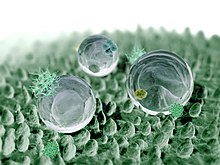
Coated fabrics are those that have undergone a coating procedure to become more functional and hold the added properties, such as cotton fabrics becoming impermeable or waterproof. Coated textiles are used in a variety of applications, including blackout curtains and the development of waterproof fabrics for raincoats.
Coating
The coating is an application of chemical substances on the surface of fabric that is to be made functional or decorative. Coatings use less material than other types of applications, such as exhaust or padding on stenter.
History
The earliest known coated fabric is Oilcloth. Oilcloth is produced by the application of boiled linseed oil. The use of boiled oils can be traced back to 200 AD.
Types
Coated fabrics can be made in a variety of ways, depending on the coating ingredients used, such as chemical and particles. Rubber, plastic, and vinyl coatings are just a few examples. Nanofabrics are coated with a wide range of nanoparticles to make the fabrics capable of enhanced properties such as ultrahydrophobicity, medical textiles (antimicrobial resistance), Ultraviolet protection, and elasticity.
Nanofabric coatings create fabrics whose fibers have better durability and wearability, and less coating material is needed compared to conventional finishes due to the ordered structure.
Use

The applications and uses of coated fabrics are numerous.
- In manufacturing of pristine clothes.
- Self cleaning fabrics with lotus effect.
- PPE kits, aprons, coverall and gowns for healthcare workers usable in viral diseases such as COVID-19, medical textiles with protecting properties, body fluid resistance and antimicrobial surface.
- Coated fabrics also contribute to fire-retardant fabrics.
- In distinctive areas, coated fabrics are used for transportation, industrial application, geotextile, and military use.
See also
References
- Denny, Grace G. (Grace Goldena) (1962). Fabrics. Internet Archive. Philadelphia, Lippincott. p. 18.
- "Surface coating | chemistry". Encyclopedia Britannica. Retrieved 2021-08-08.
- "Using Liquid Finishes to Create Nanofabrics". www.asme.org. Retrieved 2021-08-08.
- "MoreInfo-Staining and Finishing for Muzzeloading Gun Builders - Methods and Materials 1750-1850". 2013-05-30. Archived from the original on 2013-05-30. Retrieved 2021-08-08.
- United States. Bureau of Agricultural Economics (1952). Survey of canvas awning fabricators. National Agricultural Library U. S. Department of Agriculture. Washington, D.C. : U.S. Dept. of Agriculture, the Bureau. p. 1.
- Ambroziak, Andrzej; Kłosowski, Paweł (2014-01-15). "Mechanical properties for preliminary design of structures made from PVC coated fabric". Construction and Building Materials. 50: 74–81. doi:10.1016/j.conbuildmat.2013.08.060. ISSN 0950-0618.
- Xue, Chao-Hua; Chen, Jia; Yin, Wei; Jia, Shun-Tian; Ma, Jian-Zhong (2012-01-15). "Superhydrophobic conductive textiles with antibacterial property by coating fibers with silver nanoparticles". Applied Surface Science. 258 (7): 2468–2472. Bibcode:2012ApSS..258.2468X. doi:10.1016/j.apsusc.2011.10.074. ISSN 0169-4332.
- Shateri-Khalilabad, Mohammad; Yazdanshenas, Mohammad E.; Etemadifar, Ali (2017-05-01). "Fabricating multifunctional silver nanoparticles-coated cotton fabric". Arabian Journal of Chemistry. 10: S2355 – S2362. doi:10.1016/j.arabjc.2013.08.013. ISSN 1878-5352.
- Tsuzuki, Takuya; Wang, Xungai (2010-01-01). "Nanoparticle Coatings for UV Protective Textiles". Research Journal of Textile and Apparel. 14 (2): 9–20. doi:10.1108/RJTA-14-02-2010-B002. hdl:10536/DRO/DU:30020676. ISSN 1560-6074.
- Xue, Chao-Hua; Jia, Shun-Tian; Zhang, Jing; Tian, Li-Qiang (2009-06-30). "Superhydrophobic surfaces on cotton textiles by complex coating of silica nanoparticles and hydrophobization". Thin Solid Films. 517 (16): 4593–4598. Bibcode:2009TSF...517.4593X. doi:10.1016/j.tsf.2009.03.185. ISSN 0040-6090.
- Perelshtein, Ilana; Lipovsky, Anat; Perkas, Nina; Tzanov, Tzanko; Аrguirova, M.; Leseva, M.; Gedanken, Aharon (2015-07-01). "Making the hospital a safer place by sonochemical coating of all its textiles with antibacterial nanoparticles". Ultrasonics Sonochemistry. 25: 82–88. doi:10.1016/j.ultsonch.2014.12.012. hdl:2117/27155. ISSN 1350-4177. PMID 25577972.
- "Using Liquid Finishes to Create Nanofabrics". www.asme.org. Retrieved 2021-08-08.
- "Lasers help create water-repelling, light-absorbing, self-cleaning metals". New Atlas. 2015-01-21. Retrieved 2021-08-08.
- "Lotus Effect - an overview | ScienceDirect Topics". www.sciencedirect.com. Retrieved 2021-08-08.
- Karim1, Nazmul1; Afroj, Shaila; Lloyd, Kate; Oaten, Laura Clarke; Andreeva, Daria V.; Carr, Chris; Farmery, Andrew D.; Kim, Il-Doo; Novoselov, Kostya S. (2020). "Sustainable Personal Protective Clothing for Healthcare Applications: A Review". ACS Nano. 14 (10): 12313–12340. doi:10.1021/acsnano.0c05537. ISSN 1936-0851. PMC 7518242. PMID 32866368.
{{cite journal}}: CS1 maint: numeric names: authors list (link) - ^ Dehghani, Mohammad Hadi; Karri, Rama; Roy, Sharmili (2021-06-26). Environmental and Health Management of Novel Coronavirus Disease (COVID-19). Academic Press. p. 200. ISBN 978-0-323-90924-2.
- Galante, Anthony J.; Haghanifar, Sajad; Romanowski, Eric G.; Shanks, Robert M. Q.; Leu, Paul W. (2020-05-13). "Superhemophobic and Antivirofouling Coating for Mechanically Durable and Wash-Stable Medical Textiles". ACS Applied Materials & Interfaces. 12 (19): 22120–22128. doi:10.1021/acsami.9b23058. ISSN 1944-8244. PMID 32320200. S2CID 216084757.
- Horrocks, A.R. (2008-01-01). "Flame retardant/resistant textile coatings and laminates". Advances in Fire Retardant Materials. Woodhead Publishing Series in Textiles: 159–187. doi:10.1533/9781845694701.1.159. ISBN 9781845692629.
- Bhatnagar, Vijay Mohan (1973). Fire Retardant Coated Fabrics Formulations Handbook. Technomic Publishing Company. ISBN 978-0-87762-117-1.
- Fung, W. (2002-05-23). Coated and Laminated Textiles. Woodhead Publishing. pp. 9, 247. ISBN 978-1-85573-576-7.